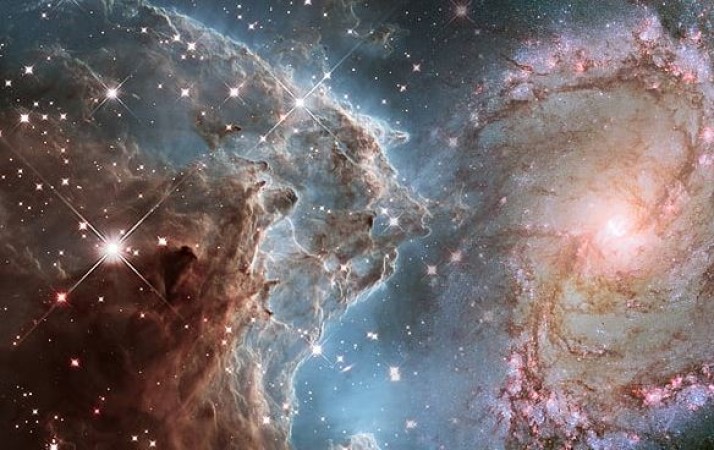
In Hindu mythology, the story of Brahma, the creator of the universe, holds immense significance. As one of the principal deities of the Hindu pantheon, Brahma's role in shaping the cosmos and bestowing life upon it is of great importance. Let's delve into the captivating tale of Brahma and the creation of the universe, as narrated in ancient Hindu scriptures.
The Origin of Brahma
Mythological Background
According to Hindu scriptures, before the creation of the universe, there was nothing but an eternal, formless, and infinite cosmic ocean. Within this ocean lay Lord Vishnu in a state of deep meditation. During his trance, a lotus emerged from Vishnu's navel, and within that lotus was Brahma, the creator.
Brahma's Birth
Brahma, with four heads representing the four directions and four Vedas, emerged as a symbol of divine intelligence and creative energy. He is often depicted sitting on the lotus that birthed him, signifying purity and transcendence over the material world.
Brahma's Creation of the Universe
The Cosmic Egg
In his cosmic mission to create the universe, Brahma divided the lotus into three parts. From one part, he formed the heavens (Swarga), from the second, he shaped the Earth (Prithvi), and the third part became the underworld (Patala). This division resulted in the triloka, the three realms.
Creation of the Elements
Next, Brahma created the fundamental elements that constitute the universe. He produced space, air, fire, water, and earth, establishing the building blocks for all forms of life to manifest.
The Birth of Devas and Asuras
Brahma's creative endeavors led to the birth of Devas (celestial beings) and Asuras (demons). Devas embodied goodness and light, while Asuras represented darkness and negativity. The eternal struggle between these forces became a recurring theme in Hindu mythology.
The Formation of Humans
To maintain harmony in the universe, Brahma created humans, entrusting them with the power of reason and free will. They were to uphold dharma (righteousness) and play a vital role in the balance of the cosmos.
Brahma's Role as the Creator
As the creator of the universe, Brahma is revered as the grandfather of all beings. Despite being one of the Trimurti (trinity) alongside Vishnu and Shiva, he is less commonly worshipped compared to the other two deities. Nevertheless, Brahma's role as the generator of life remains central to the Hindu belief system.
The Four Yugas (Ages) of the Universe
According to Hindu cosmology, the universe undergoes cycles of creation and destruction, known as the Yugas. These Yugas are characterized by different moral and spiritual qualities and are as follows:
Satya Yuga (Golden Age)
The Satya Yuga represents the golden age of truth and virtue, where righteousness prevails, and humanity is at its pinnacle of morality.
Treta Yuga (Silver Age)
In the Treta Yuga, virtue and righteousness decline slightly, leading to some moral imperfections.
Dvapara Yuga (Bronze Age)
As the Dvapara Yuga unfolds, morality and virtue continue to decline, leading to further spiritual degradation.
Kali Yuga (Iron Age)
The Kali Yuga, the current age, is characterized by moral decay, ignorance, and an increasing lack of spirituality.
The Story of Brahma's Consort Saraswati
Saraswati, the goddess of knowledge, arts, and music, is the consort of Brahma. She plays a significant role in the creative process and is depicted as sitting on a lotus alongside Brahma. Saraswati's association with Brahma highlights the importance of wisdom and creativity in the act of creation.
The Importance of Brahma in Hinduism
Despite being less worshipped, Brahma's role as the creator is fundamental to Hindu cosmology. He symbolizes the ever-present force of creativity that sustains and nurtures life in the universe.
The Legend of Brahma's Fall from Grace
In a less popular tale, Lord Brahma faces condemnation when he becomes infatuated with his own creation, Saraswati. This myth serves as a reminder of the dangers of ego and self-absorption, even for divine beings.
The story of Brahma and the creation of the universe holds profound meaning in Hinduism. Brahma's role as the generator of life, alongside his consort Saraswati, highlights the importance of wisdom, creativity, and harmony in the cosmic order. Despite the changing ages and the rise and fall of civilizations, Brahma's eternal presence remains a symbol of hope and the cycle of creation that continues to shape our universe.
Intrigue and Devotion: Understanding the Secretive Gods of Hindu Faith
Sawan's Third Monday throngs Devotees to Temples
Secularism and Religion: Striking the Balance for Peaceful Coexistence